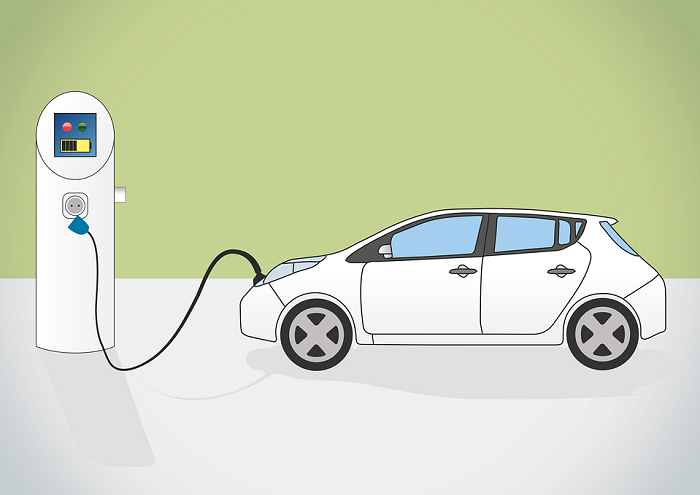
With Dieselgate and concerns about the emissions of Diesel and Petrol cars there is a definite shift towards electric or Hybrid vehicles in the public perception and also in local and central governments. With ‘clean zones’ being planned that totally or partially ban Diesel cars from town centres such as London, Southampton and Oxford to name a few coming into force in the near future is it time to switch to and Electric or Hybrid Vehicle?
Here we try to address some of the options and explain some of the jargon associated with an Electric or Hybrid vehicle to help that informed decision.
It is a widely held view that Electric cars (EV) are better for the environment, quieter and lower maintenance than petrol/diesel cars and every manufacturer has now committed to ramp up production of these vehicles expanding the technology across their range.
EV cars can be charged at public charging stations. Some are free, others charge a small fee, and they are becoming increasingly available across the country. According to recent press releases several of the large petrol station chains such as BP are committing to install charging points in their filling stations over coming months and years.
However, for convenience, most EV car owners do the majority of their charging at home. Electric cars have ranges of 200-300 miles, so home charging will suffice for day to day running, but may need supplementing on long journeys.
This in itself raises issues if your car is a company car or if you don’t have off street parking. To address this government has given local councils funds to install street charging but the take up has been slow to say the least.
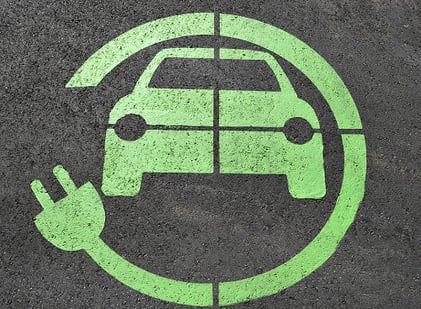
How Do Electric Cars Work?
There are generally 2 types of EV technology: hybrid and pure electric.
Fully Electric Car
The main parts in an electric car are a rechargeable battery, controller and electric motor/s. First, the battery is powered from connection to the mains then when the car is running the controller converts the current from DC-AC so that it can be used by the motor. The motor convert’s the electrical energy to mechanical energy until the battery’s charge is depleted. Power is also recovered from braking or coasting by the controller automatically.
Hybrid Car
Hybrid works on the joining together of two technologies, petrol and battery and there are generally 2 types plug in and recuperative only. The batteries and the electric motors are similar to fully electric vehicles but smaller and often configured differently.
Generally the petrol engine powers the car for normal driving and the batteries power the electric motor to provide extra acceleration or can be set to power the car on their own for a limited range of up to 30 miles. Most Hybrid cars will pull away from the lights on battery only and then start the engine and this can be far smoother than the traditional start stop technology on today’s diesel and petrol cars.
What Are The Benefits Of Electric Cars?
- They produce no tailpipe emissions, so are better for the planet.
- They are exempt from road tax and from the London Congestion Charge.
- They often have a smoother drive than petrol cars.
- They are cheaper to run.
- Do not need much maintenance, as they have fewer moving parts.
- They reduce the tax burden as benefit in kind for company car drivers.
What Are The Downsides Of Electric Cars?
- They can have a comparatively limited range. This depends on the model, the weather and the style of driving but the manufacturers range figures are always worked out on absolutely perfect conditions so expect around 70% of the quoted figures in real life usage.
- Depending on the car and the charger, they can take a long time to charge 6-9 hours at home or 45 min for 80% charge at a service station.
- Batteries may need replacing after 5-10 years in order to retain efficiency. After a few thousand charges the battery will lose its ability to hold charge as effectively, this doesn’t mean you have to change them but the range will decrease.
- Not all parts of the country will have a charging point nearby yet.
Can I Charge My Car From The Mains?
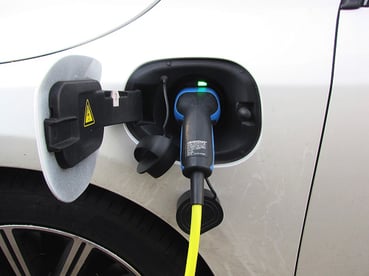
There are several options here.
The first is straight from the mains at home and depending on your home wiring should take 6-9 hours the easiest thing to do is to plug your car in overnight, particularly if you have an economy 7 tariff.
As a short-term or occasional solution, charging from the mains is fine. Continued daily use of a standard power socket, however, is not recommended by car manufacturers.
The solution therefor is to install your own specially-designed charger, and these are becoming more and more common as adoption of the technology grows. Needless to say Lowe and Oliver are qualified installers and offer this service.
The second option is to charge from public chargers at service stations or public charging sites, though growing in availability at a fast rate they may not be where you want them and of course it takes time to charge even at the higher speed these offer.
The final option of course if it is a company vehicle is to have a specially-designed charger installed at your place of work, and given the size of many company fleets this will become more and more popular.
How Safe Are Electric Cars?
Electric cars are measured by the same safety standards as any other car, and many have the highest 5-star ratings. There have been (very rare) reports of lithium ion batteries catching fire and exploding, but extra safety measures are installed to ensure this should not happen.
Everyone will remember ex Top Gear host Richard Hammond crashing a battery powered supercar which then burnt to the ground, but we have all passed normal cars on the side of motorways that are burnt out wrecks as well.
Safety devices fitted to road legal cars include fuses and circuit breakers, plus coolant run through battery packs to keep them at a low temperature.
Fans of petrol cars argue that chemicals in an electric car battery will catch fire in the event of a crash. However, a tank full of petrol is about as flammable as you can get. This is why some people believe electric cars are in fact the safer option.
Can I Get A Grant For An Electric Car?
You can get a government grant of up to £4,500 for an electric car and £500 towards a home charging point.
Although electric cars are generally more expensive to buy than internal combustion engine equivalents, their lower running costs (and obviously their lower environmental impacts) mean they are still an attractive alternative. When it comes to the running costs of electric cars, there are two main figures: the cost of charging, and how far that charge will get you (i.e. the cost per mile).
Charging Costs
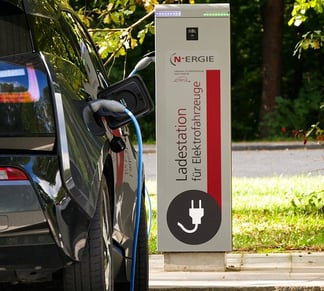
How much it costs to charge your car will be influenced by the efficiency of the charger, as well as where you choose to charge your car. If you charge at a public charging point, you will pay whatever rate the company charge you, for example Fleet Services in Hampshire charge you 30p/KWh or 15p/KWh if you have signed up to the provider.
If you charge at home from the national grid, the cost will depend on which electricity tariff you are on. Charging at off-peak times with Economy 7 tariff will be the cheapest. Otherwise, you will normally be paying around 12p per kilowatt-hour to charge from the mains. (2017)
Cost Per Mile
The cost of running an electric car per mile depends on how much it costs to charge and how far it can go before requiring charging again (its range). The range of electric cars varies widely, just as the MPG of petrol/diesel cars does. Until fairly recently, their range was limited to less than 100 miles, but it is now commonly as high as 250 miles.
Just like a normal car, the efficiency of an electric car can only be estimated, as there are a lot of variables which affect it. These include the weather, the driving style and speed, and how heavily the car is loaded. The ‘real-life range’ will be different from the full-efficiency one specified by the manufacturer.
The Sums
The battery size in an electric car is the rough equivalent, practically speaking, of the fuel tank size of a petrol/diesel car. By working out how much it costs to fill either, and then dividing this number by how many miles you expect to get out of the tank, you can figure out an average cost per mile.
Electric Car
Battery capacity x cost per unit of electricity = cost of a full charge
Cost of charging ÷ range = cost per mile
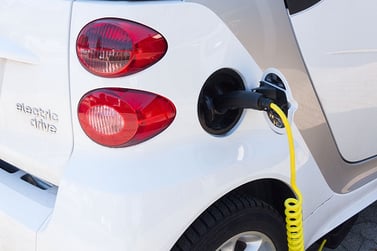
Petrol Car
Fuel tank capacity x cost per unit of petrol = cost of a full tank
Cost of fuelling ÷ range/fuel efficiency = cost per mile
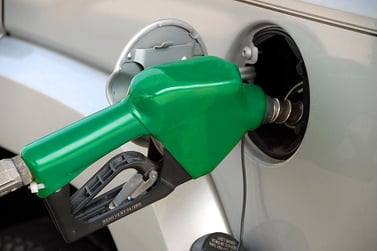
The Results
Based on two similarly-sized cars a Renault Clio Expression 1.2 and a Renault Zoe Expression Nav (the cheapest of each model) and a ‘real-world’ view on range for the electric car rather than the max range at full efficiency. (Again this is subjective and will vary on driving style for both vehicles)
| Zoe (Electric) | Clio (Petrol) | |
| Tank/battery capacity | 41kWh | 45L |
| Cost per unit of fuel | 12p | £1.19 |
| Total cost of charging/fuelling | £4.92 | £53.55 |
| Range (miles) | 186 | 504 |
| Cost per mile | 2.6p | 9.4p |
How Much Do Electric Cars Cost?
Although electric cars are marginally more expensive to buy than the equivalent petrol/diesel car and the price of electric cars varies greatly, from around £12,000 to over £100,000 for luxury models. It really depends whether you are looking for a run around, a big family car or a stylish high-end model. Their increased initial cost (comparative to petrol cars) is offset over their lifetime by reduced running costs and of course the wider adoption of the technology is already dropping the price and can be expected to go further as more high volume cars adopt the technology.
Can I Get A Grant For An Electric Car?
The UK Government offers generous grants towards the cost of electric vehicles. A fully electric car is eligible for a grant of up to:
- 35% of the cost of a car, up to a maximum of either £2,500 or £4,500, depending on the model
- 20% of the cost of a van, up to a maximum of £8,000
Can I Get A Grant For A Home Charging Point?
Yes. The OLEV Grant – provided by the Office for Low Emission Vehicles – gives eligible electric/hybrid car owners a grant of £500 towards installing a home charging point. This covers most of the installation cost, meaning you only need to buy the charger itself.
If your electric or plug-in hybrid vehicle was bought since 1st April 2015 and you have off-street parking, you will be eligible for the grant, providing you use an OLEV-approved installer such as Lowe and Oliver. You can get one charging point installed per eligible vehicle and up to two per household.
Clearly, as there are no tailpipe emissions, electric cars are better for the environment than other options. However, that does not mean they are completely carbon neutral, as manufacturers might like you to believe.
Are Electric Cars Better For The Environment?
Electric cars are a more environmentally-friendly option than traditional cars because they produce no tailpipe emissions. However, they are not considered carbon neutral unless the electricity they run on is generated from a renewable source.
Making cars uses a lot of energy. Studies have shown that manufacturing an electric vehicle generates more carbon emissions than building a traditional car. Factories use vast amounts of energy and often produce huge levels of greenhouse gas emissions.
Energy Source
Electric cars are only as green as the energy you charge them with. As a majority of the UK’s electricity comes from non-renewable sources, your car will have indirectly generated carbon emissions before you even get in it and drive.
Until very recently, the UK has generated a majority of its energy from coal-powered plants. Burning coal has several downsides for the environment. It releases large amounts of carbon dioxide and other harmful gases into the atmosphere; this pollution affects human health as well as contributing to global warming.
The Government are keen to replace coal with fracking or nuclear when coal power plants are shut down, neither of which are fully green alternatives. This means, like it or not, there will be an environmental impact from you using an electric car.
A potential way around this problem is the future is battery storage. Whilst at the moment, electricity is largely used at the time it is generated, new technology means it can be stored efficiently for the first time. In theory, a household could charge an electric car from a battery fed with electricity generated at home, with solar PV, wind or water.
Battery Recycling
Electric cars have huge chemical batteries and research is still ongoing for a low-energy, environmentally friendly way to recycle them.
At the moment, recycling lithium-ion car batteries is long-winded and inefficient. In some cases, a battery is shredded and separated into its components, where some materials such as metal may be able to be reused. Or, if it may still hold some charge, it is frozen in liquid nitrogen and smashed into bits. It is estimated that only 20% of the materials can be reused after these processes.
Although an electric car battery is considered redundant once it only retains 70-80% of its original capacity, many of them function after removal from vehicles and could therefore be converted for use with solar PV systems. Much research is going in to the life cycle of batteries.
Conclusion
While electric vehicles do have some impact on the environment, they are still a great option for reducing your carbon footprint, compared to standard petrol or diesel engines.
Charging points can be installed for a modest fee both at home and in your place of work.
Electric and Hybrid cars/vans/lorries will become more and more common over the next few years and charging points will become common place though likely lagging behind Electric car adoption.
The Future
Without the aid of a crystal ball who knows what tomorrow will bring but it is obvious from the press that car manufacturers, industry and universities are investing ever more heavily on clean technology.
Some of the future options are:-
- Hydrogen fuel sells – this would be a hybrid with the clean fuel cell charging the batteries which run the vehicle and promises much greater range whilst keeping the costs low – Extremely clean technology but very much in its infancy.
- New battery technology – there is much talk in the press of new batteries that will charge in minutes not hours and be far greener to make and dispose of. An example would be batteries made as a spin-off of contact lens technology or manufactured from a carbon fibre derivative.
- Super capacitors – able to hold far more energy and charge extremely quickly there are some prototypes in existence, however capacitors lose their charge if not used for an extended period.
- Renewable energy – Wind and water derived energy is increasing around the world but has its own challenges, not least because of its inconsistent production, no wind no energy and the many planning issues. But with the emergence of new storage methods both on an industrial scale and on a home scale coming online recently will continue to grow.



